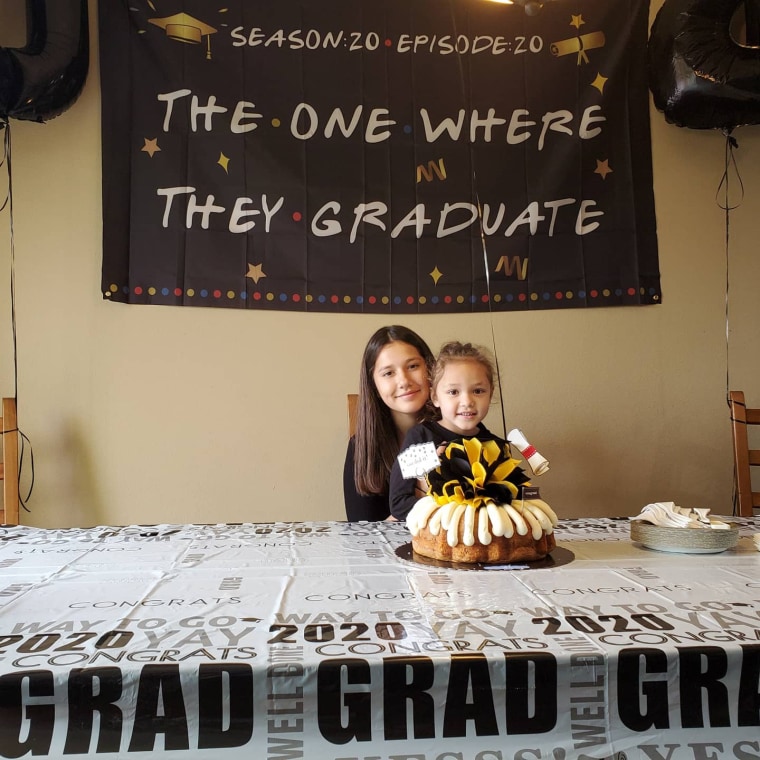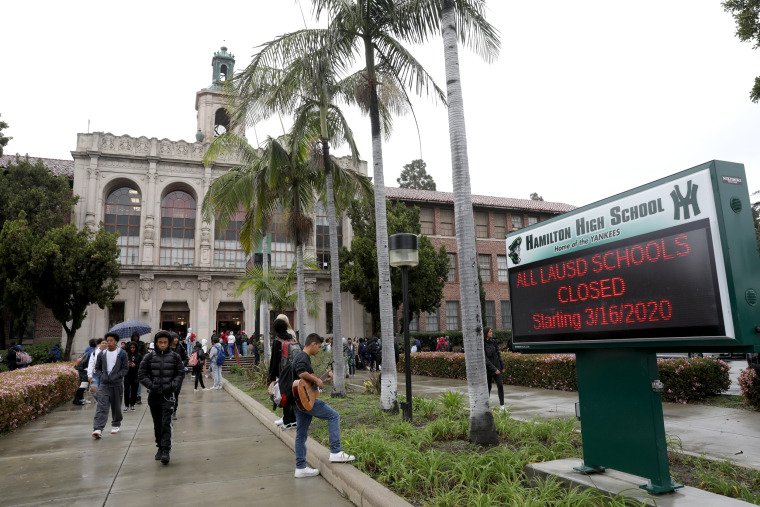This article first appeared on NBC Latino.
Martha Villatoro was excited to enroll her 4-year-old daughter, Abigail, in school "to interact with other kids, since she's an only child," but this was cut short when the Los Angeles Unified School District closed down in March due to the coronavirus pandemic.
"The adjustment was tough for Abigail," Villatoro, 34, said in Spanish. The little girl went from a bustling class full of children and teachers to being home along with her mother, learning through a digital device.
Abigail is one of more than 670,000 students in the nation's second-largest school system who will be taught online when the new school year starts in August, after LAUSD announced there won't be in-person instruction.
Villatoro was told her daughter's school would provide them a tablet in time to start pre-kindergarten classes via Zoom, a video conference software, on Aug. 19. But Villatoro still "doesn't feel 100 percent ready" for the new semester.
As school districts nationwide reconsider their reopening plans for the upcoming school year, a survey from the polling firm Latino Decisions conducted on behalf of Abriendo Puertas/Opening Doors, a parent-led educational organization, found that Latino families "are apprehensive about the prospect of distance learning," mainly due to concerns over internet access and children falling behind educationally while families grapple with the health and financial consequences of the coronavirus pandemic.
"We know, as educators and advocates, that in-person instruction is the best way to deliver high-quality education," said Stephanie Parra, executive director of All in Education, an Arizona-based advocacy group. "Unfortunately, right now it's not the safest way."
Robert Fernandez, 36, has three children in schools around Sylmar, California: Samantha, 14, who's starting high school; Derek, 11, who's in elementary school; and Roxanne, 5, who's starting kindergarten.

Although Fernandez believes their home has good enough internet and technology equipment to do distance learning, he said connectivity can still be a challenge when all the children are using the internet while their mother also works from home.
A third of Latino families nationwide don't have regular internet access at home. Among those who have internet, 37 percent said they can only access it through a cell phone, which is not ideal for home schooling, Latino Decisions found.
"If you're getting choppy video, if you're getting choppy reception, if your teacher is kind of cutting in and out due to the quality of your computer or internet speed, those are little things that can hinder their ability to grasp new concepts," Fernandez said.
His children "were very disappointed" after learning their classes were going "completely online five days a week," he said. "We're basically talking about a full year worth of school that these students have had to learn online. That's a long time, a lot of self-teaching instead of being taught."
"My biggest fear is for my daughter that's going to high school. We all know high school is a very crucial point in anybody's life; it kind of develops who you are, and I think we're robbing her and a lot of other students and children from that," Fernandez said. He's also afraid his youngest daughter won't have a good "foundation for the rest of her academic career."
Fears of falling behind
The Latino Decisions survey found that 83 percent of primary caregivers are concerned that their children aren't learning enough from online schooling and will fall behind.
The Fernandez siblings had a test ride with online classes earlier this year as schools tried to finish off their spring semesters remotely.
"At first, they felt it was kind of cool, like a mini-vacation," Fernandez said. "But my two oldest then felt like they weren't getting anything out of learning on their own with little access to tutoring."
Latino Decisions found that 74 percent of Latino parents said they would like to have more access to one-on-one tutoring for their children, and 76 percent said they want more time with teachers — whether in-person, online or over the phone. This was especially important for immigrant families who speak primarily Spanish at home, according to the survey.
Villatoro, who recently started taking English classes, said she was motivated by the need to better communicate with her daughter's teachers.
"Even though the school offers translation options, I can't always open up with the teacher as much," she said.
Vanessa Jimenez, 46, helps middle school students transition to high school in Arizona. She worries about the Latino parent "who would have come in and asked a hundred questions" to a school staff member or a teacher but now only has online access.
"Now, they aren't asking any questions or they're asking the neighbor or somebody in their community to help them," Jimenez said.
Despite academic worries, safer at home
Despite the challenges with distance learning, a majority (68 percent) of Latino parents support continuing with it during the fall semester, "a strong indication of the level of concern Latino families have about COVID-19," Latino Decisions said, as the virus continues to disproportionately infect and kill Latinos across the nation.
Jimenez is one of them. Her son is supposed to start third grade at the Phoenix Elementary School District on Aug. 6. But she's not comfortable sending him after her brother, who lives next door, got sick with the coronavirus and was hospitalized for almost a week.
Jimenez, who already picked up a laptop for her son to start online classes, said she doesn't feel ready enough to help him, since she's not clear on the benchmarks her son needs to fulfill to successfully pass his courses.
"I have no idea how that's going to look like. All I know is that school is online from 8 a.m. to 3 p.m.," she said.
Adrián Pedroza, national director of strategic partnerships at Opening Doors, said many parents nationwide share similar worries.
"That's a big thing we heard from parents: They need help understanding what a school schedule looks like at home," Pedroza said, adding that better communication between the school and the parents on lesson plans and schedules is a top concern.
In addition, schools need to take into account the economic stress many parents are feeling.
"On top of this pressure, they're figuring out how to best keep learning going for their children," Pedroza said. "Economic insecurity can contribute to toxic stress, and the well-being of families and children is key to their ability to learn."
Mixed-immigration-status families like Villatoro's didn't qualify for coronavirus aid, though they are still recovering from pandemic-related financial losses. The Fernandez household saw cutbacks on its wage increases, as well as on bonuses and commissions.
"We could think about ways to reduce that economic stress," Pedroza said, "and support families with housing, unemployment benefits and how we give access to some kind of economic relief to our undocumented families."
